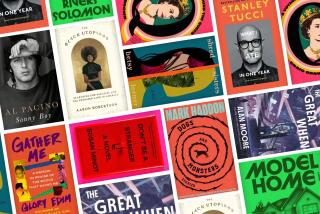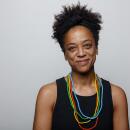‘Hunger,’ Roxane Gay’s striking memoir of food, trauma and the body, is ferociously honest
Like the majority of women in America, I think about nearly every piece of food that I put into my mouth. We all know why too. Because apart from money, thinness is the country’s most valued and desired currency. If you are a woman, of any race, it’s nearly impossible not to internalize this mainstream mantra of emaciation as the end goal, but if preempted and perpetuated by sexual assault, a woman’s body can become the towering embodiment of exquisite pain. Such is the case for Roxane Gay, whose latest work, “Hunger,” is a memoir of her body and how she has lived in and with it since surviving a horrible act of violence.
Gay, who rose to literary stardom in 2014 with her cheeky, brilliant bestselling collection of essays, “Bad Feminist,” has written powerfully and often for various publications about gender, race, identity, pop culture and personal politics, but “Hunger” is the first book-length piece of writing that focuses explicitly on her weight. “This is a book,” she writes, “about living in the world when you are three or four hundred pounds overweight, when you are not obese or morbidly obese but super morbidly obese.” What evolves from there is a bracingly vivid account of how intellect, emotion and physicality speak to each other and work in tireless tandem to not just survive unspeakable hurt, but to create a life worth living and celebrating.
Roxane Gay appears in Los Angeles on Monday June 26; tickets are $32 - $55. »
The critical beauty of “Hunger” is that Gay is so much smarter than everyone who has judged her based on her appearance, which she manages to convey without airs or ever actually stating this as fact. Her candor and self-awareness are necessary and reliable guides for the poignantly afflicted journey from a happy, pretty girl in a loving family to “a thing, flesh and girl bones” used, broken and discarded by a teenage boy and his friends. And then, the three-decade aftermath. “Those boys treated me like nothing so I became nothing.”And yet there is not a single moment throughout the book when this statement rings irrefutably true, which is to say Gay’s mighty strength of character, sapient insights, deep and abiding love from and for her family (“We’re always tied together with our eyes and our lips and our blood and our bloody hearts”) are, to my mind the very opposite of nothingness.
I do not know why I turned to food. Or I do.
— Roxane Gay
But that’s what is also remarkable about this book, and which also serves as an ongoing theme from chapter to chapter: It is, and it isn’t. In several instances, Gay drops a spare but searing existential paradox: “I do not know why I turned to food. Or I do.” “I do not have an answer to that question, or I do.” “This is no way to live but this is how I live.” “I wish I knew why. Or I do know why.” “I wrote this book. I don’t know why. Or I do.” Usually, it’s the latter that becomes her sustained reality, but there is also the sense that one reality could not exist without the other — a crucible of warring reflections.
Indeed, Gay does know why she turned to food. “Food offered comfort when I needed to be comforted and did not know how to ask for what I needed from those who loved me.” The daughter of middle-class Haitian immigrants, Gay and her two younger brothers were raised in Nebraska as Haitian American kids, well loved and provided for, with a reverence for their heritage and a healthy attitude toward food. As Gay began to put on weight, though, it became a serious problem. “When you are overweight in a Haitian family, your body is a family concern.” And so began years of her parents engaging in crisis management — Gay’s body being the crisis.
With each dichotomous experience she devours her way through, her body expands — but so does her mind and her heart.
At 13, just one year after the assault, Gay goes away to private school (Phillips Exeter Academy), where she indulges in her love of books and discovers an affinity for theater but struggles with the trauma she has shared with no one, and subsequently, eats. “The fat,” Gay writes, “created a new body, one that shamed me but one that made me feel safe, and more than anything, I desperately needed to feel safe. I needed to feel like a fortress, impermeable.” There were bouts with illness and a summer away at weight loss camp, but each time she lost weight she would undo what was outwardly perceived as progress in order “to make my body bigger and bigger and bigger and safer.”
There were years of loneliness, body-shaming and racism — Gay includes an anecdote from when she opened her acceptance letter to Yale within eyeshot of a white male peer: “He looked at me with plain disgust. ‘Affirmative Action,’ he sneered, unable to swallow the bitter truth that I, a black girl, had achieved something that he could not.”
Later, Gay discovered online chat rooms, where she could “pretend to be thin and sexy and confident,” battled bulimia for four years and spent a “lost year” in Arizona, when she was involved with both men and women, before graduate school in Michigan, where Gay, who identifies as queer, fell into a healthy, loving relationship with a man. With each dichotomous experience she devours her way through, her body expands — but so does her mind and her heart.
“Hunger” is also a pointed takedown of America’s massive commercial thinness marketing machine — namely, reality TV, a multibillion-dollar industry that includes television shows like “The Biggest Loser,” “Extreme Makeover: Weight Loss” and most recently, Khloé Kardashian’s “Revenge Body,” where guests get revenge on someone who has betrayed them by losing weight and getting in shape. “It’s a hell of a thing,” writes Gay, “this idea that the way to truly settle old scores is to get thinner and fitter.”
She also calls out the steady stream of celebrities who endorse weight loss programs — Valerie Bertinelli for Jenny Craig, Weight Watchers’ Jessica Simpson, Jennifer Hudson and, of course, Oprah Winfrey, who sells the product with this message — “Inside every overweight woman is a woman she knows she can be” — to her gargantuan fan base, which at the height of her show was predominantly white and female, although she has shifted her focus to black viewers with the launch of OWN.
I was surprised that Gay, who has spent her professional adult life primarily in rural Midwestern college towns that are, by her own admission, “inhospitable to blackness,” didn’t address more directly the role that race plays in this bought-and-paid-for aspiration. The commercial and consumerist narrative surrounding women’s bodies is based entirely on a white female aesthetic. As a black woman adopted into a (thin) white family, who attended all-white schools, I was barraged with images of whiteness as the standard of beauty until my 20s. It was then, when I met and became friends with other black women, that I realized my body, which has fluctuated but is neither fat nor especially thin, didn’t have to be impossibly skinny to be beautiful. Meanwhile, I have had white women gush openly (and unsolicitedly) about my curves while failing miserably to hide their own palpable relief at being just shy of anorexic.
Black women’s bodies are statistically curvier, rounder, fuller and — despite ceaseless criticism that stretches from Sarah Baartman and the Venus Hottentot all the way up to Serena Williams — to each other and, broadly speaking, within black culture, our curviness is considered the standard, and very often beautiful. But curviness is not the same as super morbidly obese in this country, and no one is more acutely aware of that than Gay. And now, of course, we are witnessing a peak moment in the body-positivity movement, a racially inclusive movement of self-acceptance no matter the size or girth of your body, which is all to the good, and Gay touches on it briefly in the book, but that was also pioneered by two white women (Connie Sobczak and Elizabeth Scott).
At the start of “Hunger,” Gay refers to her body as “unruly.” By the end, though, Gay’s body is less unruly and somewhat more unfettered. She writes: “I no longer need the body fortress I built.” Gay knows she has work to do beyond just weight loss, that the next chapter in her life will be a process of “undestroying” herself.
Undestroyed, unruly, unfettered, Ms. Gay, live your life. We are all better for having you do so in the same ferociously honest fashion that you have written this book.
Carroll is editor of special projects at WNYC radio in New York and the author of several books of narrative nonfiction about race in the United States. She is one of The Times’ critics at large.
ALSO:
Roxane Gay and Randa Jarrar talk Twitter, ‘Difficult Women’ and kink in L.A.
Roxane Gay’s new book “Difficult Women” proves her power
Roxane Gay withdraws Simon & Schuster book over Milo Yiannopoulos
“Hunger”
Roxane Gay
Harper: 320pp., $25.99
More to Read
Sign up for our Book Club newsletter
Get the latest news, events and more from the Los Angeles Times Book Club, and help us get L.A. reading and talking.
You may occasionally receive promotional content from the Los Angeles Times.








